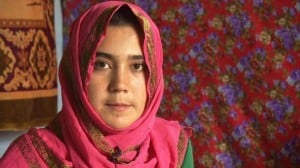Merve Kavakçı, the Turkish female lawmaker who was thrown out of parliament because of her hijab and later even stripped of her citizenship, will be restored in her rights, according to Turkish media outlets. The details of what this may include are yet unclear.
The island nation of the Maldives is in turmoil, with ongoing protests in support of the ruling president Waheed and other protests in support of deposed president Nasheed. Last week Maldivian women organised their own rally, in support of Nasheed, their elected leader.
According to a research in The Netherlands, a surgery to reconstruct the hymen does not lead to the desired outcome: bleeding when having sexual intercourse.
The widow of the “7 July bomber,” Muslim convert Samantha Lewthwaite, has been on the run with her children, as she allegedly has ties with a terrorist cell in Kenya, who were planning attacks in the African country.
The UN pressures the FIFA to allow female soccer players to wear a safe, velcro opening hijab.
Saudi women might be allowed to join the Islamic police force of the country; currently, a commission is looking into the possibilities of recruiting women.
According to a local expert, every month, around 15-20 Hindu girls are forced to convert to Islam and marry Muslim men in Pakistan. Many Hindu families fear for the future of their daughters in the country, and some of them have actually left Pakistan.
Palestinian Hana Shalabi has been arrested and held without trial for over 2 weeks, and has been on a hunger strike since. She has said that she will continue her strike until she is freed.
Provincial candidate Waheeda Shah Bukhari has shocked Pakistan, after videos of her slapping elections officials became public. She did win a majority of the votes to guarantee her a seat in the provincial parliament, but the election commission is refraining from declaring her the winner. For obvious reasons.
The Unfinished Revolution: Voices from the Global Fight for Women’s Rights is the title of a book that will be published next week to coincide with International Women’s Day. The book includes over 30 essays by different authors, among them Somali gynaecologist Hawa Abdi and Nobel Peace Prize Winner Shirin Abadi.
Divorce in Iran is a costly affair, many marriage contracts include an agreement that in case of divorce the wife receives her weight in cold coins. With gold prices soaring and divorce rates increasing, more men are unable to pay, and many of them end up in prison.
Popular Uzbek singer Yulduz Usmanova will perform again in her home country, after being banned for around 5 years over alleged antigovernment remarks.
Om Zied, the female journalist that has always been an open critic of former Tunisian president Ben Ali, remains critical of the current regime, but not pessimistic.
After her husband was injured, Pakistani Shakila assigned herself the job of traffic officer in Karachi, where she works alongside paid traffic cops.
Through organising themselves in cooperatives, Rwandan Muslim women have been able to earn a steady income, changing the lives of themselves and their families. In the past five years a million Rwandans have been able to cross the poverty line and find themselves in much better circumstances.
The virginity test trial in Egypt has been postponed, once again, and will now continue mid-March.
Nebahat Albayrak could become the first Muslim Leader of Dutch Labour party PvdA. She is the first Muslim (woman) to try to become the leader of a political party in The Netherlands.
Certain Egyptian high-end establishments have declared themselves “hijab-free” zones, where veiled women are not welcome. Among the Egyptian elite many are worried about the growing influence of Islamic parties in the country.
Jordanian women have been protesting to receive citizenship rights for their children with a non-Jordanian partner. If the citizenship law will not be amended, they threaten to protest on a weekly basis.
In her weekly column, Hannatu Musawa calls for the wives, mothers and daughters who are affiliated to Boko Haram, to speak out against the violence and to turn to Islamic sources to understand that the perpetual violence is not condoned in Islam.
Eurasia.net featured a photo essay on a traditional village wedding in Tajikistan.
For about three decades women in the village of Katiya Kammu, India, have not voted; the main reason for that is the strict custom of purdah that the women follow. Election officials are trying to convince the men in the village to permit the women to cast their votes in the upcoming March 3 elections.
In Sierra Leone, Sisters of Deensul has been launched. This organization aims to empower and encourage Muslim women, who have been facing increased discrimination in the recent years.
Al Arabiya features the story of Jameela, a trans woman in Pakistan.
Rahat, a 14-year-old from Kyrgyzstan, had to quit school, because she refused to attend classes without wearing her hijab. This is typical for the Central Asian country, where some believe that with allowing more religious freedom, traditional values will be done away with.
In Pune, India, Shamim Pathan could be the first Muslim woman to hold the post of mayor. The March 13 mayoral elections will give the final result.











